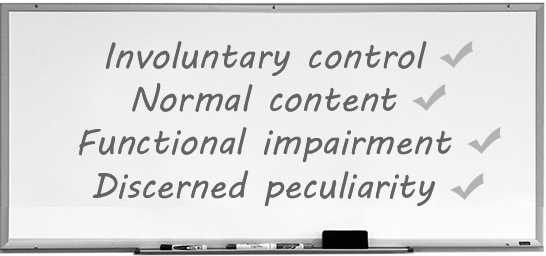This section seeks to differentiate “normal” variants from psychopathological variants to avoid confusing genuine extrasensory experiences with features of mental disorders.
An important area of research, in this clinical field, is the exploration of the relationship and various influences between psychiatric diseases and paranormal experiences. The fundamental necessity in this line of research is a distinction and a proper understanding of the apparent normality of the individuals who experience psi or other exceptional phenomena on the one hand and, on the other hand, the perceived abnormality of those who are considered psychiatrically ill. However, “normality” can be conceived along statistical, sociological and psychological frameworks.” – Giovanni Iannuzzo – Clinical Parapsychology and Parapsychological Counseling in Psychiatric Practice
Definition of a Mental Disorder
According to the DSM-5: “A mental disorder is a syndrome characterized by clinically significant disturbance in an individual’s cognition, emotion regulation, or behavior that reflects a dysfunction in the psychological, biological, or developmental processes underlying mental functioning. Mental disorders are usually associated with significant distress or disability in social, occupational, or other important activities.” The DSM-5 continues by stating: “An expectable or culturally approved response to a common stressor or loss, such as the death of a loved one, is not a mental disorder. “
Extrasensory Experiences & Psychopathology
While some extrasensory experiences may present similar features to mental disorders, such experiences should not be automatically associated with known psychopathology. Because of this, psychic experiences should be classified and addressed in a different manner than mental disorders. Today, the Diagnostic and Statistical Manual of Mental Disorders includes a non-pathological category titled “religious and spiritual problems,” V62.89 (Z65.8) to classify psychic experiences.
| V62.89 (Z65.8) Religious or Spiritual Problem This category can be used when the focus of clinical attention is a religious or spiritual problem. Examples include distressing experiences that involve loss or questioning of faith, problems associated with conversion to a new faith, or questioning of spiritual values that may not necessarily be related to an organized church or religious institution. – DSM-5 |
Differential Diagnosis
The importance of differential diagnosis is evident when extrasensory experiences are reported by individuals with a current diagnosis or history of mental disorder (e.g. psychotic or dissociative disorders). The importance of differential diagnosis is equally as essential when extrasensory experiences are reported by individuals with no history of psychiatric illness.
 The following summary of factors relate to the content, form, and processing of purported extrasensory experiences that are indicative of psychopathology or normal behaviors. In cases where primary factors are normal with minimal pathologising factors present, a co-diagnosis of a mental disorder with genuine extrasensory experiences may be appropriate.
The following summary of factors relate to the content, form, and processing of purported extrasensory experiences that are indicative of psychopathology or normal behaviors. In cases where primary factors are normal with minimal pathologising factors present, a co-diagnosis of a mental disorder with genuine extrasensory experiences may be appropriate.
Purchase the textbook for more detailed information »
| Pathologising Content Factors | Involuntary Volition & Control (i.e. undirected control and inexplicably induced), Negative Valence (i.e. evoked negative emotions (e.g. sadness, anger, fear, disgust, guilt, shame, or contempt) and was abusive, injurious, insidious, painful, or threatening), Abnormal Content (i.e. significantly unusual content that is considered bizarre, detailed, disturbing, distressing, and/or alienating), Malignant Entity (i.e. interaction with an entity(s) presenting in a harmful and unconstructive manner where conveyance of the experience has features of paranoia, dangerousness, and negative emotional response), Delusions (i.e. highly unusual or bizarre meaning), Functional Impairment (i.e. (1) occasional withdrawal from family and friends, negative job reassignment, reduction of income, or poor grades, or (2) complete withdrawal from family and friends, job loss, or inability to attend classes), Peculiarity Dismissal (i.e. inability to discern peculiarity), Medication Tolerance (i.e. tolerates and responds to psychotropic or anti-psychotic medications). |
| Normal Content Factors | Voluntary Volition & Control (i.e. explicable or moderately explicable and self-induced or indirectly intentional), Positive Valence (i.e. evoked positive emotions (e.g. joy, elation, relief, hope, interest, bliss, or pleasure) and was wished for and/or wanted, or had no emotional effect and had no harmful effect), Normal Content (i.e. usual or slightly unusual content that is considered accommodating, results in helpful motivation, is vague, but somewhat discernible, and has a positive effect on sociability), Benign Entity (i.e. interaction with an entity(s) presenting in a assisting or non-harmful and constructive manner where conveyance of the experience does not have features of paranoia, dangerousness, and negative emotional response), Normal Beliefs (i.e. normal or slightly unusual meaning), Functional (i.e. (1) little to no effect, (2) healthier relationships with family and friends, positive job reassignment or increased income, (3) higher grades, or very healthy relationships with family and friends, job promotion, substantially increased income, or substantially higher grades), Discerned Peculiarity (i.e. ability to discern peculiarity), Medication Intolerance (i.e. does not tolerate and respond to psychotropic or anti-psychotic medications). |
General Description of Extrasensory Experience: Abstract, fragmented, or somewhat vague, infrequent, occurring in brief episodes, and are typically accommodating and constructive.
General Description of Psychotic Experience: Vivid and often overrides and dominates the individual’s perceptual field, which may or may not result in immobility (e.g. catatonia), are frequent, occurring in episodes that last for an extended period of time, and are accusatory, threatening or non-constructively critical.
Diagnostic Criteria
Citation: Kelly, T.M. (2015). Clinical Parapsychology: Extrasensory Exceptional Experiences (Textbook). University of Alternative Studies. Purchase.
Copyright © 2014 Theresa M. Kelly, MsD. This article is licensed under a Creative Commons Attribution-NonCommercial-NoDerivatives 4.0 International License.
